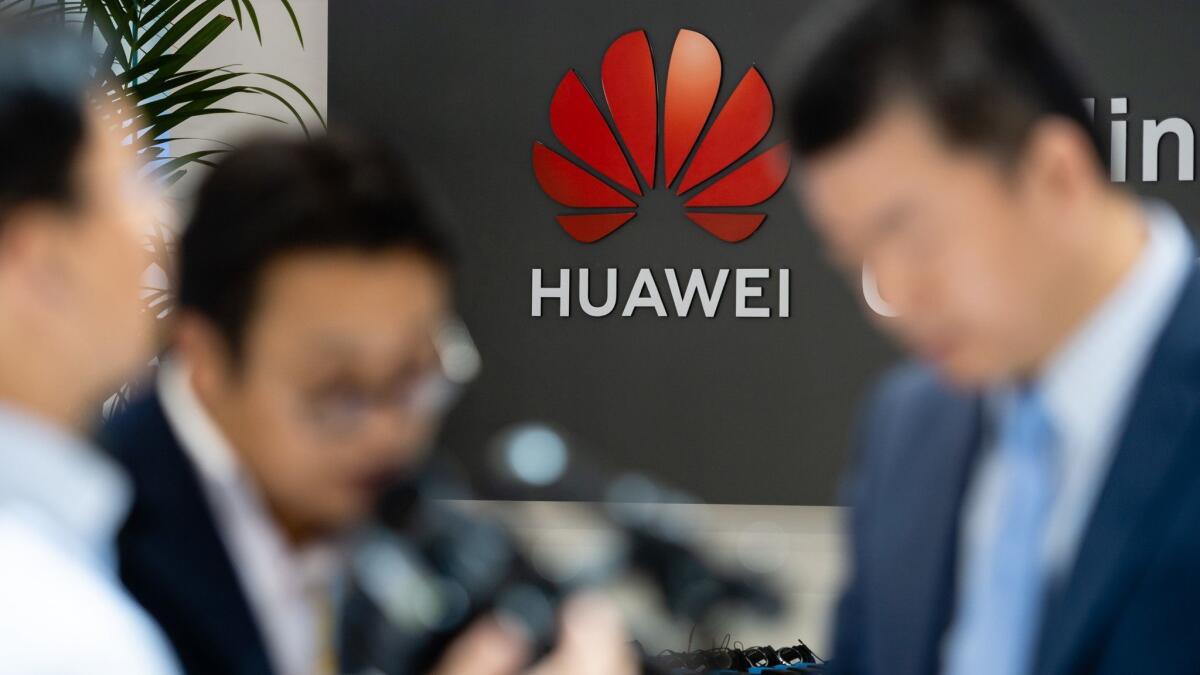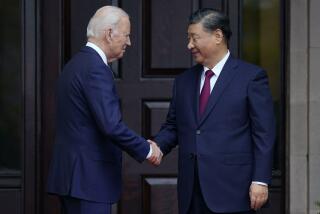U.S. officials plan for a future in which Huawei has a major share of 5G global networks

- Share via
U.S. national security officials are planning for a future in which the Chinese firm Huawei will have a major share of the advanced global telecommunications market, and have begun to think about how to thwart potential espionage and disruptive cyberattacks enabled by interconnected networks.
“We are going to have to figure out a way in a 5G world that we’re able to manage the risks in a diverse network that includes technology that we can’t trust,” said Sue Gordon, the deputy to the director of the U.S. intelligence community. “We’re just going to have to figure that out.”
U.S. officials have not let up on their campaign to urge other countries to block Huawei — a firm with close ties to the Chinese government — from their burgeoning 5G networks. The fifth-generation networks will power everything from self-driving cars to military operations.
But the officials are cognizant that many countries already use low-cost Huawei equipment and will probably continue to rely on it as they transition to the next generation of mobile telecommunications, which will be up to 100 times faster than current 4G platforms.
“You have to presume a dirty network,” Gordon said at an intelligence conference at the University of Texas, Austin last week. “That’s what we’re going to have to presume about the world.”
Officials have begun discussing ways to use encryption, segmented network components and stronger standards to protect key systems. Several years ago, the major U.S. telecom providers began designing into their 5G network features aimed at keeping domestic systems safe from spying and cyberattacks by adversaries and criminals.
U.S. officials, frustrated by persistent demands that they reveal a “smoking gun” to back up their warnings that Huawei represents a security risk, have pushed the argument that Chinese laws compel firms such as Huawei to cooperate with intelligence agencies, without the judicial and legal safeguards that exist in the United States.
Gordon’s remarks — striking for their bluntness about the need to prepare for a future with Huawei in the networks — reflect the twin pressures officials face as they to try to persuade allies that long-term national-security interests should take precedence over short-term economic benefits.
Huawei’s founder, Ren Zhengfei, insists his company has never shared information with the Chinese government and that it does not plan to. “For the past 30 years we have never done that, and the next 30 years to come, we will never do that,” he told CBS News in February.
The company is embroiled in a number of international conflicts.
Its founder’s daughter, Huawei Chief Financial Officer Meng Wanzhou, is fighting extradition to the United States after she was arrested in Vancouver, Canada, on Dec. 1. U.S. prosecutors have filed charges accusing her of lying to banks about dealings with Iran.
And this year, Huawei pleaded not guilty to U.S. trade-theft charges after a federal court in Seattle unsealed a 10-count indictment in January against two of its units, Huawei Device Co. and Huawei Device USA. The charges include conspiracy to steal trade secrets, attempted theft of trade secrets, wire fraud and obstruction of justice.
Huawei has denied any wrongdoing. Last month the company sued the U.S. government over a law banning federal agencies from using its equipment.
German security officials have urged their ministers to block Huawei from the 5G networks. But there, as in other European countries, appeals to heed the security risks are competing with Huawei’s aggressive price-slashing that especially targets firms under economic duress.
“I can’t understand how German telecom providers are so naive about Huawei,” said one senior German security official, who spoke on the condition of anonymity to discuss a sensitive matter. “If the Chinese authorities want access [to the networks], Huawei will have to grant it, and that’s a problem.”
Already, Huawei controls the 4G market in Africa, much of the Middle East, southern Europe and parts of Southeast Asia.
“Huawei has a desire to dominate the 5G market,” said James Lewis, a technology and cybersecurity policy expert at the Center for Strategic and International Studies. “There’s no way we’re going to keep them out everywhere.”
Major U.S. telecoms fear that if Huawei corners the market, shutting out the handful of European competitors that exist, there will be no option for other countries in the future but to use Huawei.
The four major U.S. firms — AT&T, Verizon, Sprint and T-Mobile — have pledged to the U.S. government that they will bar Huawei and another Chinese firm, ZTE, from the 5G networks. But they must still connect with foreign networks, and if those networks are running Huawei, American traffic will traverse boxes that Huawei controls.
That has prompted warnings from officials such as Secretary of State Michael R. Pompeo. In February, Pompeo told allies in Budapest, Hungary, that using Huawei could make it difficult for the United States to “partner alongside them” if their equipment ties into “important American systems.”
The U.S. ambassador to Germany, Richard Grenell, sent a letter to German officials in March saying the United States would limit intelligence sharing with Berlin if Huawei is allowed to provide Germany’s 5G network.
U.S. intelligence sharing “is a matter of life and death for us,” the German security official said. Last year, for instance, the United States passed intelligence to the Germans that helped them track an alleged terrorist plot involving the deadly biotoxin ricin.
The German government has ruled out a ban on Huawei, but Jürgen Hardt, a member of the German parliament, said he believes officials in Berlin are taking the potential threat seriously. “We are aware of the challenge and we are handling that challenge well,” he said.
Hardt said authorities have set a high barrier for participation in construction of the 5G network, insisting on strict security protocols he said would be difficult for Huawei to meet.
The German security official said he believed Huawei equipment would not be in any systems that underpin military or critical infrastructure such as water and electricity.
Britain already bars Huawei from the government and all critical networks. And its presence in the commercial 4G system is limited to one-third of the components that are separate from the network core. The other two-thirds are split between the Finnish company Nokia and the Swedish firm Ericsson.
Some U.S. officials say the greater threat is not espionage, but disruption of critical systems in a crisis.
Telecom firms such as AT&T and Verizon have engineered features such as gateways through which all untrusted international traffic must pass to be scrubbed for malware or other forms of attack.
“The 5G standard is being built with security from its inception, building on lessons learned from previous generations of wireless,” said one telecom industry official, who spoke on the condition of anonymity because he was not authorized to speak publicly on the issue. “And it is an iterative process, so that as problems arise, they can be addressed.”
Experts say that although 5G services will emerge over the next few years, a full build-out will take 10 to 20 years. It takes time to install network antennas on street corners across the nation, to produce fleets of cars that can drive themselves and to deploy sensors that will power smart cities and factories.
That gives the U.S. government time, if it starts now, to execute a strategy to seed innovation in 5G technologies so that more players can enter the market for integrating the hardware and software to compete with Huawei, said Thomas Donahue, a retired CIA analyst and former White House official who devoted 30 years to technology and national security issues.
But, he said, “we will not succeed unless government and industry come together. This requires leadership from the U.S. government — from the top. In this regard, we may have something to learn from China.”
The Associated Press was used in compiling this report.






